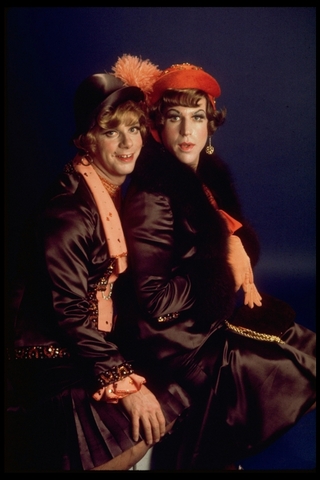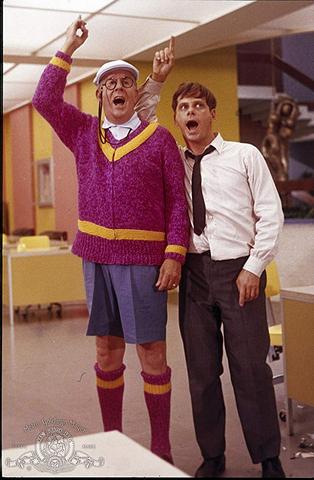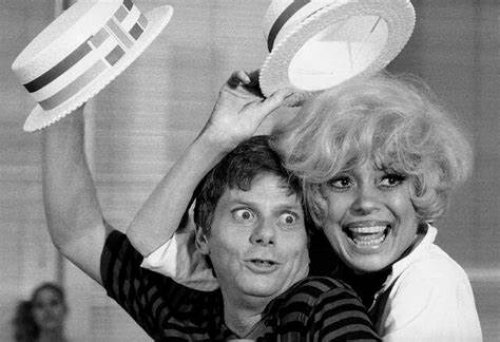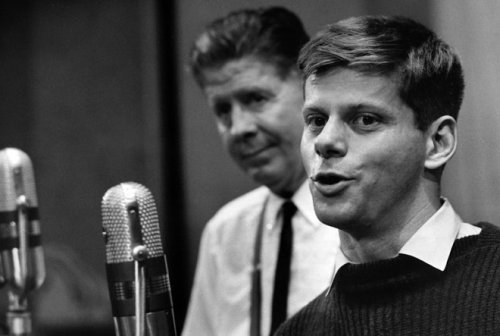Robert Morse: An Appreciation
Robert Morse seemed to be born for musical comedy. You could give him a show that wasn’t really great and he’d somehow create moments of delight; he just had that magic in him.

Robert Morse
[avatar user=”Chip DeFFaa” size=”96″ align=”left”] Chip DeFFaa, Editor-at-Large[/avatar]
I’m sorry to note the passing of Robert Morse, who’s died after a short illness. He was 90, and was a great favorite of mine. I found his charm irresistible, on stage and offstage.
He seemed to be born for musical comedy. He was-along with Joel Grey and Robert Preston–one of the greatest male musical-comedy personalities of my lifetime. Oh, he had successes in film and TV, too, and to younger people he may be best known for playing Bertram Cooper on television’s Mad Men for eight seasons. But it was on the Broadway stage that he got to shine brightest. He didn’t have to push, or appear to work hard on stage; he simply had enough magic in him to fill any theater.

Actors (L-R) Robert Morse & Tony Roberts in a publicity shot from the Broadway musical “Sugar”
You could give him a show that wasn’t really great (like the awkward musical comedy Sugar, based on the much-better film Some Like it Hot) and he’d somehow create moments of sheer delight onstage; people were responding to his buoyant personality not to the oddly uneven material. (I was disappointed in that show, but he was always worth watching on stage. And, at his best, was incandescent.)
He won a Tony Award starring in the Broadway masterwork How to Succeed in Business Without Really Trying. And fortunately his performance was captured well in the film adaptation of that brilliant show. (Watch that film for a sample of his greatness.)

Rudy Vallee and Robert Morse in a scene from the film version of “How to Succeed in Business Without Really Trying (Courtesy of Metro-Goldwyn-Mayer)
And he won another Tony Award for Tru, his one-man show about Truman Capote (which was later successfully adapted for public television). He was simply compelling. And people who would never have watched the real Truman Capote speak for an evening were mesmerized by his theatrical version of Capote. I was impressed, too, by his ability to surrender himself entirely to the needs of the role; if he was portraying a real person, like Truman Capote (or, later, Dominick Dunne, for American Crime Stories), he could become the character so thoroughly, you almost forgot you were watching Robert Morse.
He had good memories of appearing as the original Barnaby Tucker in Thornton Wilder’s comedy The Matchmaker (the inspiration for Hello, Dolly!), both on Broadway (starring Ruth Gordon as Dolly Gallagher Levi) and then on screen (starring Shirley Booth as Dolly Gallagher Levi), and later co-starring with the irrepressible Carol Channing in the national tour of Sugar Babies.

Robert Morse and Carol Channing rehearsing for the national tour of “Sugar Babies”
There were frustrations in his career, too, of course—the shows that, despite the best efforts of a lot of top talents, never quite worked, like the highly anticipated Broadway musical So Long, 174th Street (based on Carl Reiner’s book, Enter Laughing, and the hit play—based on that book–by Joseph Stein). That show came so close to succeeding at times, I wished they could have had more time to develop it before opening on Broadway. (It should have been a hit.) There were good moments in it, but it hadn’t quite found its stride yet; and it closed in just two weeks. He’d devoted more than a year of his life to it, and the show ran for just 16 performances on Broadway. Ouch!
Robert Morse understood, as well as anyone, what a hit-or-miss kind of business “show business” can be. It was a business, he sometimes suggested, for masochists. And wonderfully talented people can wind up with significant gaps in their careers. But he loved getting up on stage—whether he was with a performer who never missed (like Carol Channing) or one who was much less reliable (like the inspired but erratic Jackie Gleason, with whom he appeared on Broadway in Take Me Along).

Rudy Vallee and Robert Morse at the recording session for the original Broadway cast album of “How to Succeed Without Really Trying”
I remember, one time when we were talking on the phone about 15 years ago, and he told me–with no bitterness, just an acceptance of what he figured were the realities of life–that he figured his career was by then pretty much over. He was in his mid-70s, still spoke with a boyish enthusiasm that I loved, and was grateful for the career he’d had. But he told me he hadn’t received a good offer of work in several years and figured the industry had pretty much written him off as being too old. (He had no TV or film work at all—not even a small role–in 2003, 2004, 2005.) Shortly after that phone call with me, he got offered Mad Men, and enjoyed a career resurgence in his 70’s and 80’s that he’d never imagined was possible. He also returned to Broadway at the age of 85, to appear in The Front Page. And he enjoyed doing voiceover work, to practically up until the end—I think his final voiceover job was playing “Santa Claus” in a Teen Titans episode in 2021.
We happened to share the same birthday (May 18th), and I was thrilled that we could wish each other happy birthday. I relished having that little link with him. He knew I just loved his work.
I called him after attending the Tony Awards one year, to let him know I was delighted to see an article about him as a “Broadway legend” in the Playbill for the Tony Awards. He asked if I could mail him the Playbill, which I was happy to do. And he said something to the effect that while it’s all well and good to have people call you a “legend,” what he really liked to do was work. And he wished he’d been invited to present a Tony Award; he would have enjoyed that more than being written up for his past achievements.

Robert Morse as we remember him
I enjoyed him very much in the film The Loved One. And I remember well his TV series, That’s Life–an ambitious, if not successful, attempt to have a TV series that was a musical comedy, with new songs helping advance the story each week. But whatever genius he displayed on Broadway wasn’t really captured in the series; it had good moments and kept him busy for a year, but never quite took off.
I liked him a lot. And even though he was much older when he did Mad Men, I still think of him as the young star I first enjoyed on Broadway when I was very young myself! And it made me happy that the producers of Mad Men let him do a little song-and-dance routine on screen before the series came to an end. And you could tell, as he performed a dapper rendition of “The Best Things in Life Are Free,” the world of musical comedy was still his first love.






Leave a comment